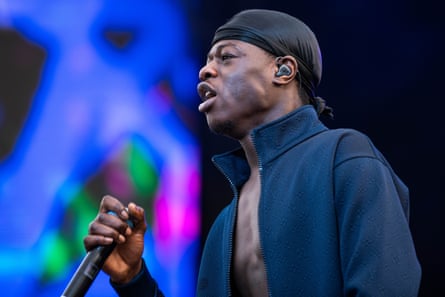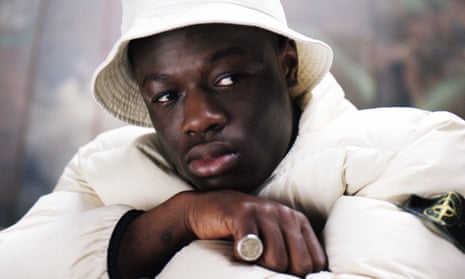We were British kids raised in African hall parties. On Saturday evenings, in community centres turned banquet halls, we huddled by round tables and scraped jollof rice from our plates while Afrobeat and African highlife blared from heavy speakers. Vocalists floated over pulsing drums and jazz-tinged brass. The songs sounded like sunshine and our parents danced through the evening till the sky went pink.
I hear the hall party in J Hus. There is a softness in his songs, a feeling of grace and ease that casts me back to those summer dances in south London.
We both hail from a generation tugged between our family’s native lands and our own birth country. Black kids raised in Britain by immigrant parents and grandparents who moved up the Atlantic from Africa. They left Gambia and Ghana, Nigeria and Cameroon; with them, they brought artists such as Fela Kuti and Victor Uwaifo, whose music told stories of the countries they had left behind.
But our upbringings, in new towns amid foreign cultures, meant we sat slightly askew from our parents. We had United Kingdom on our birth certificates and British accents on our tongues. Outside of our homes, away from the grip of family gatherings and hall parties, we were reared on homegrown genres such as grime and UK rap; we discovered bashment from our Caribbean neighbours. Africa was in our blood, but Britain was our immediate reality, and somewhere amid the collisions, J Hus found his genius.

He was born Momodou Jallow and was moulded by the melting pot of east London. His mother came to England from Gambia and raised him in Stratford, taking him to parties where, he says, they played “African music all night long”. Early music memories also include bashment, Michael Jackson tapes, and reeling off grime verses with his friends at school. When he started rapping, it seemed natural to incorporate them all.
His debut album Common Sense is where diaspora genre boundaries crumble; the 2017 record, nominated for three Brit awards, finds comfort in their dust. It blends the lightness of Afrobeats and bashment with the grittier tones of UK rap. The influences are vast and reflect the range of sounds and cultures that raised a generation of black British kids – Hus flits between pidgin English, patois and even cockney.
The production is handled by Hus’s long-time collaborator, JAE5. Apart, they are stellar but unified the music approaches something divine. On Did You See, Hus glides over tingling marimbas like birds skimming the sea, his voice at one with bashment-inspired melodies, deftly curling round the warm bassline and slightly off-key percussion. Plottin nods to the bounce and easy delivery of Mike Skinner and UK garage; the menacing thump of Clartin is pure gangsta rap, but you can hear traces of grime in his stammering delivery.
The album is a generational story captured in sound, a tale of immigration and new identities woven across 17 songs. In the ongoing conversation about what it means to be both black and British, Common Sense carves out a home in a country that can feel foreign, a reminder that though we are a generation stranded between heritage and birthplace, we have music that is distinctly our own, melodies that explain our existence, and albums that pay homage to the music we were raised on as well as the new sounds that found us in Britain.
From as early as 2011, there were dancehall-drenched cult rap classics such as Sneakbo’s Touch Ah Button and posse cuts like Gal Call Mi Up; the likes of Timbo had begun to successfully blend rap with Afrobeats. But what set Hus apart was the way he blurred the lines between all three and sang while doing it.
This inclination comes from slightly further afield: Hus grew up in an era where 50 Cent reigned supreme and In Da Club rang out at every kid’s birthday party. Hus has said that 50 has been “a massive inspiration” and that 2003’s Get Rich Or Die Tryin’ was “one of the first albums I ever bought and listened to from start to finish”.
You can hear the influence in the way he slips in and out of his low-crooned vocals, how he half-raps and half-sings, rarely committing totally to either. Instead of 50’s slurry east coast drawl, Hus adopts a distinctly black British cadence. Dem Boy Paigon, his first breakout song, is testament to this unique style. Released in 2015, the instrumental was gritty and haunting, with Afrobeats and trap stitched into its fabric by teenage producers Hendrix and Beatz. Throughout, Hus switches style like a boxer switches stance, murmuring in pidgin and patois before breaking into strait-laced English during the final verse.
The versatility of tone makes him adept at almost any genre that falls under the black British family tree. In this golden period of British music, where rap and grime have completed blistering ascents, traces of J Hus can be found across the era’s seminal records. He is the only artist to feature on all of the most recent albums from Skepta, Dave and Stormzy, coveted for his inimitable range of vocals.
He has diamonds on his tongue. He is in a league by himself. He finds comfort no matter the setting. I have seen his songs turn out bashment raves in south London, blare from soundsystems at Notting Hill carnival, grip crowds in Ghana and the floor at Nigerian wedding receptions. His music is welcomed under all roofs, a pioneer who has translated the black British experience into sound. He has cleared the path for a new crop of musicians to avoid quarantine by genre: Not3s, NSG, Belly Squad, Lotto Boyzz and more, with few objections to the way these artists hop between sounds.
Behind every rap icon is a story about the moment they straightened their lives out. Skepta flew to America and slept on friends’ floors while gathering inspiration for Konnichiwa. Stormzy quit a steady job at an oil refinery when he watched neighbourhood friends Krept and Konan win a Mobo award on TV. Rappers’ fables always begin at these forks in the road, and J Hus has his own.
On a late summer evening in 2014, somewhere in the East End, J Hus sat in a car with his childhood friend Moe. As night descended, conversation turned to the future. Hus had been incarcerated twice already and was unsure about which direction to steer his life in. When he asked his friend for counsel, Moe told him to give music a go. Hus agreed, but only if Moe would manage him. Five years on, Common Sense is certified gold, Did You See is certified platinum, and Hus has toured Europe. He is still managed by Moe and his brother Kilo under their company 2K Management.
But in 2015, Hus was stabbed five times, and a year later was convicted of possessing an offensive weapon. He would serve five months in jail, hearing inmates thump the walls whenever his songs played on the radio. A few months later, I stood in the rafters of a full O2 Arena for the Red Bull Culture Clash, a soundclash between four battling soundsystems. Rumours floated up that Hus was free, that he would show up to surprise us all – and he was duly brought out as a special guest by Brooklyn-based dancehall label Mixpak.
We erupted at his appearance, jubilant at his return, as he yelled the shifting melodies of Dem Boy Paigon. It felt like the opening of a new chapter, Hus dusting himself off from a prison sentence to return to where he belonged: the stage. But two years later, in December 2018 he was convicted again, this time for carrying a knife. He was sentenced to eight months.
It’s a story of the problems faced by young rappers who have emerged from inner cities in the last half of the decade – rappers whose lives have changed so quickly with record deals and brand endorsements that they have had little time to adjust and leave old circumstances behind.
The path to becoming a legitimate career musician is a tightrope, and many, including J Hus, have stumbled. In the courtroom, the day he was sentenced, Hus’s lawyer told the judge that “his client had felt isolated because of his fame,” and had suffered from PTSD after the 2015 stabbing.
He hints at the fallout in his music. In a freestyle from May 2015, Hus is mournfully poetic, rapping “Tell me why I always die when I’m having dreams / I had a dream that my mother had to bury me / I got rolled on by the enemy / They turnt J Hus to a memory.” These lines bring into focus the pressures shouldered by working class teenagers growing up in the UK’s inner cities, and how, layered beneath frightening headlines, are young men in need of help.
By April 2019, J Hus was a free man again. Hours after he left his cell, he walked out on to the O2 Arena stage once more – this time with Drake. Seemingly halfway between laughter and tears, he told the crowd “I missed you so much”; they wailed in disbelief as he performed Did You See.

Aside from an appearance at Wireless festival over the summer, he then went into hibernation, prepping a second album. His social media channels detailed further battles with his mental health. In October on Snapchat, he opened up in a series of posts, saying, “I don’t wanna be here no more. Not that I’m stressed or fed up, it’s just I need to go to the next stage,” and also mentioned that his forthcoming album “will be a good note to end on”. Years after that verse about dreams of dying, the mood still lingers in his music: a recent freestyle contained the line “self-medicate myself through my depression,” his delivery so smooth that it is easy to gloss over the bleak reality he speaks of.
Earlier this month, new song Must Be was released, with all the charm and finesse that stole our ears years ago. Back in arms with his masterful accomplice JAE5, Hus slides over soft strings and a deep bass. A weeping saxophone and strings herald a bittersweet return – the lyrics are east London war stories, awash with the sense of distrust that still haunts his life. Even at this testing hour, the quality of music is never in question, but supporters are anxious about how the next chapter of his story will play out.
Many hope for his peace. Whatever happens, his first chapter changed the course of black British music and picked apart the lives of a generation. Through his hybrid music, J Hus told the story of African kids who grew up on rap and grime, ate jollof at family functions and sang 50 Cent in the school playground. It’s the music we’ll one day play to our own children, years far from now when albums like Common Sense remind us not to forget the lands we came from and the cultures in which we were raised. It is music that reflects our chaotic identities. At the hall parties, we will play J Hus loud.

Comments (…)
Sign in or create your Guardian account to join the discussion